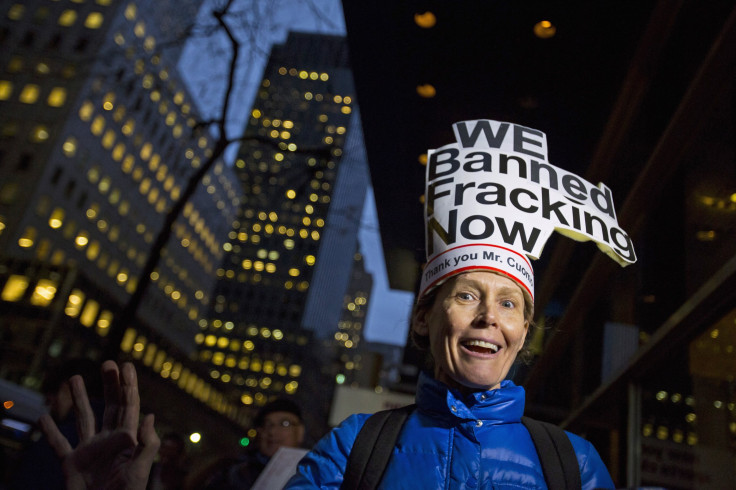Fracking Ban New York: Decision Could Embolden Lawmakers Elsewhere To Outlaw Practice

New York became the first state with immense underground gas deposits to ban hydraulic fracking statewide Wednesday, the conclusion of two years of research and debate that pitted environmentalists and health experts against energy companies and landowners who hoped it would reinvigorate upstate New York’s struggling Southern Tier. Experts said the legal and social ramifications of such a major decision could have effects nationwide as states and cities across the country consider their own legislation to outlaw or regulate fracking, whose potential health and environmental impacts have only recently come under scrutiny. Opponents of fracking said witnessing a natural gas-rich state like New York reject the controversial practice could embolden critics and lawmakers around the country to pursue outlawing it.
U.S. energy companies have been fracking in the U.S. for more than 65 years. The process involves blasting a high-pressure stream of water, chemicals and sand into underground shale to release natural gas deposits. Fracking has found a foothold in several U.S. states, most notably in Ohio, Pennsylvania and Texas. Increasing public and environmental concerns have led to moratoriums on fracking in some U.S. cities and counties over the past decade, but the legal landscape remains dubious as courts weigh state law against the rights of local governments concerned about protecting their citizens. Cities have seen some success with using zoning to restrict where energy companies could frack.
In September 2013, California lawmakers passed a bill requiring oil companies to get permits for fracking, notify neighbors of their operations and provide an explanation of the chemicals used in the process. Denton, north of Dallas, outlawed fracking in November, the first city in energy-dominated Texas to do so.
Vermont banned fracking two years ago, but “never before has a state with proven gas reserves banned fracking," Deborah Goldberg, an attorney with San Francisco-based nonprofit Earthjustice, told the Associated Press. The decision "will give courage to elected leaders throughout the country and world: Fracking is too dangerous and must not continue,” she said.
New York’s fracking ban, announced by Gov. Andrew Cuomo Wednesday, mainly affects a region known as the Southern Tier, which includes counties west of the Catskill Mountains that border Pennsylvania to the south. Landowners in the area signed on with gas companies like Chesapeake Energy Corp and Inflection Energy years ago with the idea that fracking on their lands could bring much-needed revenue into their communities. In 2012, many landowners tried to back out, citing falling gas prices and environmental and health concerns, but were barred from doing so because of a legal snare in their contracts.
How Cuomo's ban affects landowners who hoped to reap the economic benefits of fracking in the region is still unclear. The decision will “not directly impact” the landowners, Joe Heath, a lawyer in Syracuse who has worked with landowners who have leases with gas companies, told the Syracuse Post-Standard. Nor does the ban mean that the state government must compensate landowners who lost their drilling rights because the restriction does not constitute a “taking,” which occurs when a government seizes private property for public use and must pay the property owners.
Legal experts predict lawsuits challenging New York’s fracking ban. Whether such cases would prove successful is another story. "The industry has already written off New York as being influenced by a bunch of extremists,” Thomas West, an attorney in Albany who has represented the drilling industry, told the Times Union. "You will not see the industry put up money for litigation to fight this bizarre decision.”
© Copyright IBTimes 2024. All rights reserved.












